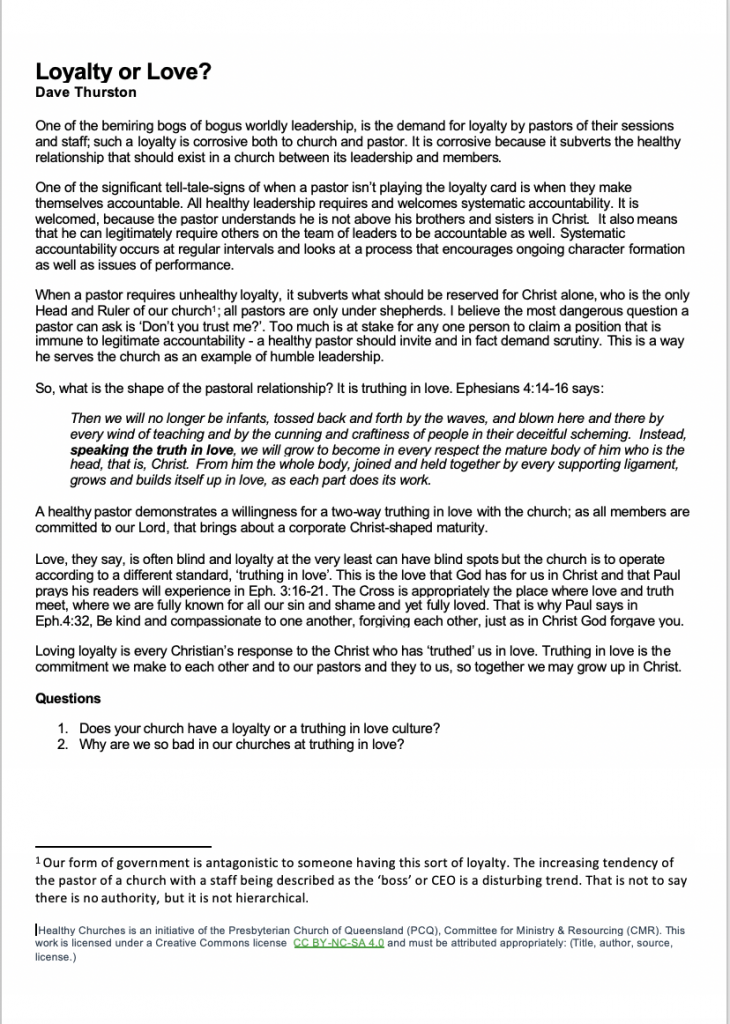A Ministry of Distinctions Series
‘A distinction without a difference’, refers to a situation where a person is mistakenly attempting to make a distinction between two things or positions that are essentially the same, therefore, ‘a distinction without a difference’. But there are things and positions that can and should be distinguished because they lead to healthy ministry, and not understanding the difference, can lead to confusion and unhealth.
In this series called, ‘A Ministry of Distinctions’ I’m wanting to identify distinctions that are real differences, and understanding those differences, can make real, substantial and healthy differences to your ministry or at the very least, provoke you to think about certain aspects of being an undershepherd of Jesus, the chief shepherd.
These papers are not long, only one page each, but they end with some questions in the hope that they could be used as discussion starters with a session or staff, MTNs or candidates for the ministry.
Part Two – Loyalty Or Love
One of the bemiring bogs of bogus worldly leadership, is the demand for loyalty by pastors of their sessions and staff; such a loyalty is corrosive both to church and pastor. It is corrosive because it subverts the healthy relationship that should exist in a church between its leadership and members.
One of the significant tell-tale-signs of when a pastor isn’t playing the loyalty card is when they make themselves accountable. All healthy leadership requires and welcomes systematic accountability. It is welcomed, because the pastor understands he is not above his brothers and sisters in Christ. It also means that he can legitimately require others on the team of leaders to be accountable as well. Systematic accountability occurs at regular intervals and looks at a process that encourages ongoing character formation as well as issues of performance.
When a pastor requires unhealthy loyalty, it subverts what should be reserved for Christ alone, who is the only Head and Ruler of our church ; all pastors are only under shepherds. I believe the most dangerous question a pastor can ask is ‘Don’t you trust me?’. Too much is at stake for any one person to claim a position that is immune to legitimate accountability – a healthy pastor should invite and in fact demand scrutiny. This is a way he serves the church as an example of humble leadership.
So, what is the shape of the pastoral relationship? It is truthing in love. Ephesians 4:14-16 says:
Then we will no longer be infants, tossed back and forth by the waves, and blown here and there by every wind of teaching and by the cunning and craftiness of people in their deceitful scheming. Instead, speaking the truth in love, we will grow to become in every respect the mature body of him who is the head, that is, Christ. From him the whole body, joined and held together by every supporting ligament, grows and builds itself up in love, as each part does its work.
A healthy pastor demonstrates a willingness for a two-way truthing in love with the church; as all members are committed to our Lord, that brings about a corporate Christ-shaped maturity.
Love, they say, is often blind and loyalty at the very least can have blind spots but the church is to operate according to a different standard, ‘truthing in love’. This is the love that God has for us in Christ and that Paul prays his readers will experience in Eph. 3:16-21. The Cross is appropriately the place where love and truth meet, where we are fully known for all our sin and shame and yet fully loved. That is why Paul says in Eph.4:32, Be kind and compassionate to one another, forgiving each other, just as in Christ God forgave you.
Loving loyalty is every Christian’s response to the Christ who has ‘truthed’ us in love. Truthing in love is the commitment we make to each other and to our pastors and they to us, so together we may grow up in Christ.
Questions
1. Does your church have a loyalty or a truthing in love culture?
2. Why are we so bad in our churches at truthing in love?


 PDF DOWNLOAD
PDF DOWNLOAD